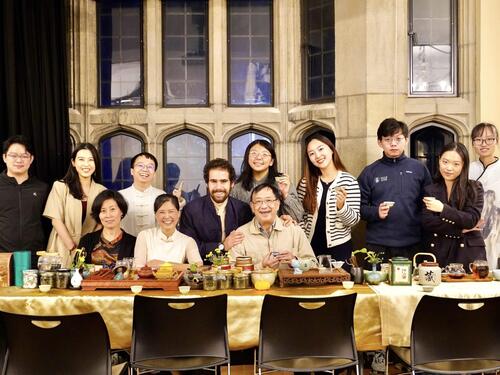
ALEXANDER MEDEL 4:20 AM, OCT 02, 2023 CONTRIBUTING REPORTER.
Yale’s campus bustled with activity last week as cultural groups hosted events for students to mingle, enjoy mooncakes and watch movies in celebration of the Mid-Autumn Festival.
The Mid-Autumn Festival is one of the most important holidays in Chinese culture and is often celebrated in late September or early October. Yale’s Taiwanese American Society and Chinese American Student Association collaborated to host a lineup of Mid-Autumn Festival events last week, including Friday’s Moonlight Mingle, which saw dozens of students gathered in the Branford College common room.
Katelyn Wang ’27, a first-year attendee, told the News that, these cultural celebrations help build a sense of family for those far from home, especially when feeling homesick.
“Family isn’t just a physical location, but it is also a celebration, and I find that here,” she said of the Moonlight Mingle.
Michaela Wang ’25, co-moderator of TAS, said that she initially thought of organizing the event with her fellow TAS leaders this past summer, but she decided that she wanted to plan the event in collaboration with another cultural club.
Over the past few weeks, TAS and CASA leaders said they were busy organizing logistics and adjusting plans for the weather. They originally wanted to hold the event in the Silliman College courtyard, per Bettina Tang ’26, co-cultural chair for CASA.
“We really wanted to have an outside event to moon-gaze,” Tang said.
But due to heavy rain on Friday, the event moved to the Branford common room, where dozens of students assembled with coats soaked and umbrellas dripping.
Thoroughly pleased with the turnout at the Mingle despite the weather, CASA co-cultural chair Ashley Zheng ’26 told the News that she was “really grateful and surprised” at the high attendance “despite the rain.”
The event featured a tea station, paper lanterns and a selection of mooncakes for students to enjoy as they engaged in conversations with friends and peers.
According to Zheng, community-building is represented in a key symbol of this event and of the Mid-Autumn Festival itself: the mooncake.
“You are not supposed to eat a mooncake on your own,” Zheng said. “You are supposed to cut it up and share it with everyone around you.”
Jerry Feng ’26 said the event was a “cool” opportunity to meet new people, particularly because it was held at the beginning of the year and because many attendees were underclassmen.
That same evening, on the other side of campus, the Chinese Language and Career Initiative and the Ancient Chinese Traditions Club held a movie screening of the film “Fagara” in Luce Hall. Moviegoers were treated to boba tea and mooncakes.
For cultural organizations, these festivities help them share the richness and diversity found within their customs and traditions.
In organizing these events, Yolanda Wang ’26, the chair of the Chinese Language and Career Initiative, said that she hopes to share modern-day Chinese traditions and “all aspects of Chinese culture that aren’t usually celebrated on campus.”
“A lot of students will take the most recognizable parts of Chinese culture, say red envelopes or mooncakes, and then blow them out of proportion or dilute them into forms that are easy to consume,” Wang said.
She added that she hopes that these cultural festivities will help community members understand and appreciate the nuance of Chinese traditions.
In addition to the movie screening, the Chinese Language and Career Initiative worked together with the Yale Chinese Program to host a Mid-Autumn Moon Festival event last Wednesday that attracted 200 attendees, including undergraduates, graduate students and faculty members. The event featured mooncakes, a professional tea ceremony expert and a panel with Light Fellows who discussed their experiences studying Chinese abroad through Yale.
Wang said that the event’s combination of traditional and modern activities exemplified the missions of the Chinese Language and Career Initiative and the Ancient Chinese Traditions Club in building an atmosphere of engagement and inclusivity.
Anna Zhao ’25, chair of the Ancient Chinese Traditions Club, also added that events like this are “very important to be more inclusive to the greater student body, including some of the faculty and some of the graduate students because everyone has such a unique experience with Chinese culture and heritage.”
Wang said that in the future, the two groups will aim to host larger events — including a cultural showcase during the Lunar New Year — now that they have more institutional support and funding.
The Lunar New Year occurs between mid-January and mid-February.